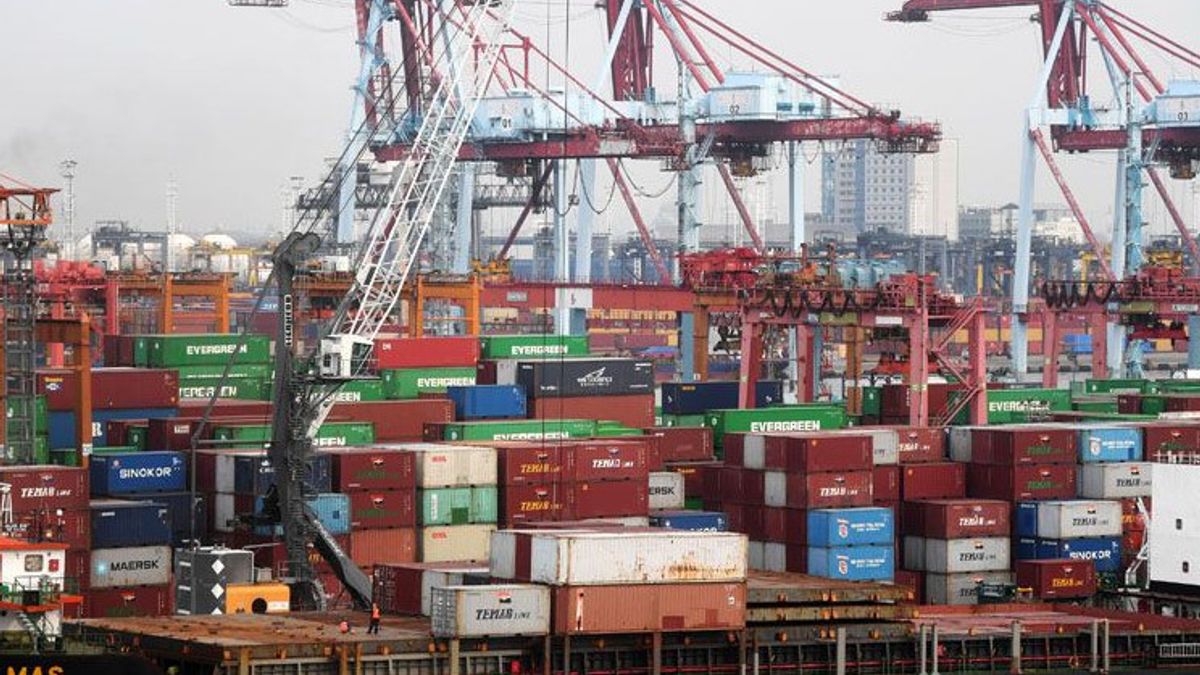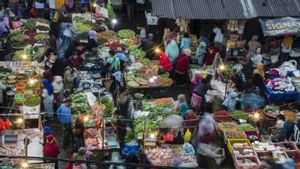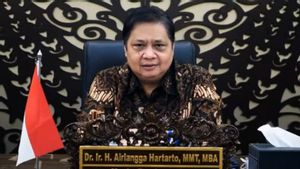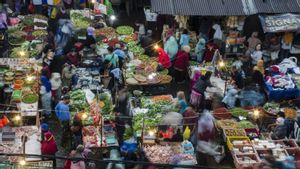JAKARTA - Bank Mandiri economist Faisal Rachman predicts the trade surplus will continue with a trend that continues to shrink or shrink. This is because imports will continue to balance exports amid accelerating economic recovery.
"This has led to an increase in domestic demand, especially for imported raw materials and capital goods (the two import groups account for about 90 percent of total imports)," said Faisal, quoted Wednesday, October 18.
Furthermore, Faisal said the government's policy to loosen various restrictions would also increase imports. For example, easing the implementation of restrictions on community activities (PPKM), has increased community mobility which can increase oil imports.
"Meanwhile, the upward trend in most commodity prices seems to be restrained amid increasing fears of a global recession stemming from a surge in inflation, which could weaken global demand. This poses a risk of weakening export performance," said Faisal.
However, said Faisal, from a number of commodity prices that were affected, demand for nickel-based commodities remained high. Faisal is also optimistic that the trade surplus will continue with a trend that continues to shrink or shrink. This condition will bring good news for the current account balance.
"The largest contributor to the surplus in the current account balance is the goods balance, which is in line with the trade balance. The trade balance is expected to remain in surplus until the end of the year, so this is still possible for the current account balance to record a surplus," said Faisal.
It is projected that the current account balance in 2022 has the potential to record a surplus of around 0.45 percent of GDP. This figure increased compared to the previous year which was recorded at 0.28 percent.
According to Faisal, economic growth in the fourth quarter is estimated to be even stronger, even though inflation is depressed. “Seasonally, consumption patterns will increase in QIV and coupled with the easing of PPKM can be a momentum. But indeed the increase can be restrained due to inflationary pressures," said Faisal.
Maintained Economic Growth is Supported by the Private Sector
Meanwhile, Deputy Director of the Institute for Development of Economics and Finance (Indef) Eko Listiyanto said that Indonesia's economic growth will still be maintained.
Eko said this was based on the latest economic developments, especially in the third quarter and the challenges that may arise in the fourth quarter.
"It looks like it might be slightly below the target. But if 5 percent, I'm still optimistic that it can still be achieved, but if it is 5.2 percent, we really have to grow quite high in the third and fourth quarters, in the midst of a declining export situation. global externalities are starting to be felt," he explained.
According to Eko, the implementation of fiscal policy as a shock absorber by the government is indeed quite helpful. Eko assesses that the Indonesian economy is supported by the private sector, which plays a big role in the current conditions.
"Because in fact fiscal only plays a role in under 10 percent of the total economy, driven more by private factors. The private sector if you look at the profile so far, the pace is still positive and increasing. Retail sales are also still high, the investment trend is also positive," he said.
SEE ALSO:
However, Eko said that next year the condition will face quite a challenge. Several large countries that are Indonesia's main trading partners will experience an economic slowdown. However, Eko predicts that Indonesia will still be able to survive and not fall into a recession.
"Indonesia is still surviving. There will be no recession, I suspect. Unless the situation is very extreme," he said.
Eko said this was because the Indonesian economy was supported by domestic consumption, so that when big countries like China and the United States experienced a recession, Indonesia could still survive.
"Actually, from the side outside of exports, not really. Indonesia's economy depends on domestic consumption. So as long as domestic people are still consuming, they are still spending, actually, the US wants a recession, China wants a recession, we will still survive," he concluded.
Previously, the Coordinating Minister for Economic Affairs Airlangga Hartarto stated that optimism for the recovery of the national economy was maintained despite the turmoil of global challenges. This is in line with the improvement of indicators in various sectors.
One of the sectors that showed significant improvement was consumption and investment, which was marked by the strengthening of people's purchasing power, maintained indicators of the Consumer Confidence Index (IKK) and retail sales, maintained manufacturing PMI at an expansionary level, and bank credit which grew above 10 percent since June 2022.
"The cooperation of all parties, including the private sector, we should be grateful for because Indonesia was able to grow above 5 percent during the last 3 quarters and we hope that in the third and fourth quarters it is able to target growth of above 5 percent so that year on year at the end of the year we are targeting 5.2 percent," said the chairman of Golkar.
The English, Chinese, Japanese, Arabic, and French versions are automatically generated by the AI. So there may still be inaccuracies in translating, please always see Indonesian as our main language. (system supported by DigitalSiber.id)

















